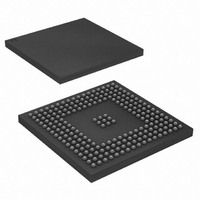AT91SAM9RL64-CU Atmel, AT91SAM9RL64-CU Datasheet - Page 265

AT91SAM9RL64-CU
Manufacturer Part Number
AT91SAM9RL64-CU
Description
IC ARM9 MCU 217-LFBGA
Manufacturer
Atmel
Series
AT91SAMr
Specifications of AT91SAM9RL64-CU
Core Processor
ARM9
Core Size
16/32-Bit
Speed
240MHz
Connectivity
EBI/EMI, I²C, MMC, SPI, SSC, UART/USART, USB
Peripherals
AC'97, LCD, POR, PWM, WDT
Number Of I /o
118
Program Memory Size
32KB (32K x 8)
Program Memory Type
ROM
Ram Size
72K x 8
Voltage - Supply (vcc/vdd)
1.08 V ~ 1.32 V
Data Converters
A/D 6x10b
Oscillator Type
Internal
Operating Temperature
-40°C ~ 85°C
Package / Case
217-LFBGA
Processor Series
AT91SAMx
Core
ARM926EJ-S
Data Bus Width
32 bit
Data Ram Size
64 KB
Interface Type
2-Wire, SPI, SSC, USART
Maximum Clock Frequency
240 MHz
Number Of Programmable I/os
118
Number Of Timers
4
Maximum Operating Temperature
+ 85 C
Mounting Style
SMD/SMT
3rd Party Development Tools
JTRACE-ARM-2M, MDK-ARM, RL-ARM, ULINK2
Development Tools By Supplier
AT91SAM-ICE, AT91-ISP
Minimum Operating Temperature
- 40 C
On-chip Adc
10 bit, 6 Channel
Controller Family/series
AT91SAM9xxx
No. Of I/o's
118
Ram Memory Size
64KB
Cpu Speed
240MHz
No. Of Timers
1
Rohs Compliant
Yes
Package
217LFBGA
Device Core
ARM926EJ-S
Family Name
91S
Maximum Speed
240 MHz
Operating Supply Voltage
1.8|3.3 V
For Use With
AT91SAM9RL-EK - KIT EVAL FOR AT91SAM9RLAT91SAM-ICE - EMULATOR FOR AT91 ARM7/ARM9
Lead Free Status / RoHS Status
Lead free / RoHS Compliant
Eeprom Size
-
Lead Free Status / Rohs Status
Lead free / RoHS Compliant
Available stocks
Company
Part Number
Manufacturer
Quantity
Price
Company:
Part Number:
AT91SAM9RL64-CU
Manufacturer:
ATMEL
Quantity:
16
Company:
Part Number:
AT91SAM9RL64-CU
Manufacturer:
ATMEL
Quantity:
255
Part Number:
AT91SAM9RL64-CU
Manufacturer:
ATMEGL
Quantity:
20 000
- Current page: 265 of 903
- Download datasheet (13Mb)
6289C–ATARM–28-May-09
Note:
3. Setting Bias and High Speed PLL (UPLL) for UTMI
4. Selection of Master Clock and Processor Clock
• If a new value for CSS field corresponds to PLL Clock,
• If a new value for CSS field corresponds to Main Clock or Slow Clock,
If PLL and divider are enabled, the PLL input clock is the main clock. PLL output clock is PLL
input clock multiplied by 5. Once CKGR_PLLR has been written, LOCK bit will be set after
eight slow clock cycles.
The UTMI PLL is enabled by setting the UPLLEN field in the CKGR_UCKR register. The
UTMI Bias must be enabled by setting the BIASEN field in the CKGR_UCKR register in the
same time. In some cases it may be advantageous to define a start-up time. This can be
achieved by writing a value in the PLLCOUNT field in the CKGR_UCKR register.
Once this register has been correctly configured, the user must wait for LOCKU field in the
PMC_SR register to be set. This can be done either by polling the status register or by wait-
ing the interrupt line to be raised if the associated interrupt to LOCKU has been enabled in
the PMC_IER register.
The Master Clock and the Processor Clock are configurable via the PMC_MCKR register.
The CSS field is used to select the Master Clock divider source. By default, the selected
clock source is slow clock.
The PRES field is used to control the Master Clock prescaler. The user can choose between
different values (1, 2, 4, 8, 16, 32, 64). Master Clock output is prescaler input divided by
PRES parameter. By default, PRES parameter is set to 1 which means that master clock is
equal to slow clock.
The MDIV field is used to control the Master Clock prescaler. It is possible to choose
between different values (0, 1, 2). The Master Clock output is Processor Clock divided by 1,
2 or 4, depending on the value programmed in MDIV. By default, MDIV is set to 0, which
indicates that the Processor Clock is equal to the Master Clock.
Once the PMC_MCKR register has been written, the user must wait for the MCKRDY bit to
be set in the PMC_SR register. This can be done either by polling the status register or by
waiting for the interrupt line to be raised if the associated interrupt to MCKRDY has been
enabled in the PMC_IER register.
The PMC_MCKR register must not be programmed in a single write operation. The pre-
ferred programming sequence for the PMC_MCKR register is as follows:
– Program the PRES field in the PMC_MCKR register.
– Wait for the MCKRDY bit to be set in the PMC_SR register.
– Program the CSS field in the PMC_MCKR register.
– Wait for the MCKRDY bit to be set in the PMC_SR register.
– Program the CSS field in the PMC_MCKR register.
– Wait for the MCKRDY bit to be set in the PMC_SR register.
If UTMI Bias is not enabled, the USB Device works only in Full Speed Mode.
AT91SAM9R64/RL64 Preliminary
265
Related parts for AT91SAM9RL64-CU
Image
Part Number
Description
Manufacturer
Datasheet
Request
R

Part Number:
Description:
MCU, MPU & DSP Development Tools KICKSTART KIT FOR AT91SAM9 PLUS
Manufacturer:
IAR Systems

Part Number:
Description:
DEV KIT FOR AVR/AVR32
Manufacturer:
Atmel
Datasheet:

Part Number:
Description:
INTERVAL AND WIPE/WASH WIPER CONTROL IC WITH DELAY
Manufacturer:
ATMEL Corporation
Datasheet:

Part Number:
Description:
Low-Voltage Voice-Switched IC for Hands-Free Operation
Manufacturer:
ATMEL Corporation
Datasheet:

Part Number:
Description:
MONOLITHIC INTEGRATED FEATUREPHONE CIRCUIT
Manufacturer:
ATMEL Corporation
Datasheet:

Part Number:
Description:
AM-FM Receiver IC U4255BM-M
Manufacturer:
ATMEL Corporation
Datasheet:

Part Number:
Description:
Monolithic Integrated Feature Phone Circuit
Manufacturer:
ATMEL Corporation
Datasheet:

Part Number:
Description:
Multistandard Video-IF and Quasi Parallel Sound Processing
Manufacturer:
ATMEL Corporation
Datasheet:

Part Number:
Description:
High-performance EE PLD
Manufacturer:
ATMEL Corporation
Datasheet:

Part Number:
Description:
8-bit Flash Microcontroller
Manufacturer:
ATMEL Corporation
Datasheet:

Part Number:
Description:
2-Wire Serial EEPROM
Manufacturer:
ATMEL Corporation
Datasheet:











